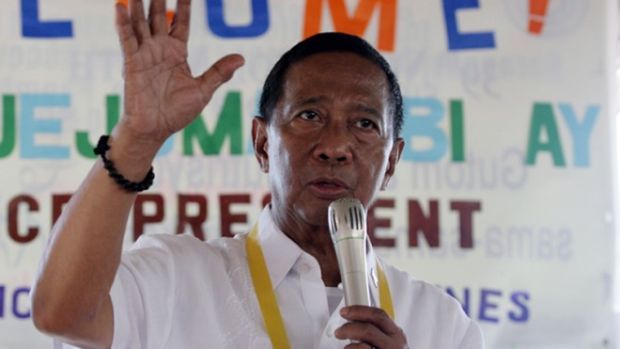Vice President Jejomar Binay on Wednesday revealed his tax reform plan that he will implement should he emerge as the victor in next year’s presidential elections.
Speaking before businessmen at the 4th Deutsche Bank Access Philippines Conference in Makati, Binay said that the current tax system being implemented in the country burdens the working class.
“The current tax system puts too much burden on working class taxpayers and very little on well-off individuals. Up to 85 percent of the total collection of individual income taxes is paid by the working class while only 15 percent comes from self-employed individuals and professionals,” Binay said.
Emphasizing that the country has the second highest personal income tax rate (32 percent) and the highest corporate income tax rate (30 percent) among its Asean neighbors, Binay said that there is a need to reform the country’s tax system for the benefit of the workers.
“Our tax system must be seen as fair. Those with bigger pay checks ought to pay higher taxes than those who earn less and inflation-adjusted tax brackets—even if it will result in a short-term reduction of tax revenues—is only just,” Binay said.
He said that instead of being bent on increasing the value-added tax from 12 to 14 percent to offset the effects of lower tax rates, the government should intensify its revenue collection efforts and crackdown on smugglers, sell government assets, privatize select government-owned and controlled corporations and approve revenue-generating measures, among other steps, to increase its revenue.
The vice president said that lowering income tax rates and corporate taxes will benefit the country in the long run and will make the country attractive to investors.
“Lowering tax rates will let consumers spend more, and the government will recover some of the short-term revenue loss through increased consumption taxes, such as VAT, without necessarily increasing it,” Binay added.
Malacañang and the Department of Finance have rejected the idea of lowering income tax rates, saying that it might derail the implementation of government projects.
“We cannot put our fiscal sustainability and credit rating at risk by doing piecemeal revenue reducing legislation,” Finance Secretary Cesar Purisima said in an earlier statement.
This sentiment was echoed by administration presidential bet former Interior Secretary Manuel “Mar” Roxas II, even dismissing the call for lowering income tax rates as a “papogi” move.
Bills seeking to lower income tax rates for private and government employees, filed by Marikina Rep. Miro Quimbo in the House of Representatives and Senator Sonny Angara in the Senate, have been languishing in Congress. JE
